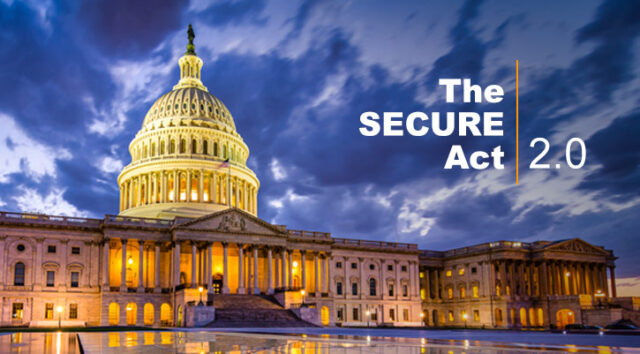Coming off a tax season where many of my clients owed tax with their return for the first time in many years, it is nice to see a new bill in Congress that will be beneficial to Americans in their pursuit of retirement security. In 2019, the Setting Every Community Up for Retirement Enhancement Act (SECURE Act) became the law of the land, and it provided some significant changes to the retirement plan landscape. Less than 3 years later, Congress appears to be ready to take these new rules even further. The House of Representatives recently approved, with a vote of 414 to 5, a second bill commonly referred to as “SECURE Act 2.0“. It is now on to the Senate, but it is widely expected that a new law will pass sometime this year. With these new rule changes, we should seize on the opportunities provided to make retirement easier or possibly more beneficial.

While there are multiple benefits and changes included in the new bill, we feel that there are two items that will significantly impact our clients. I’ll give a short explanation of those below:
Required Minimum Distributions (RMDs)
The original SECURE Act raised the age for starting RMDs from 70 ½ to 72. With that original change, there was almost immediate conversation of whether that age would eventually increase to 75. SECURE Act 2.0 proposes to raise the age to 75 over the next decade. As of 2023, the age would increase to 73. Then there would be a pause until 2030 at which time the age would increase to 74, and then another increase to 75 in year 2033. This would provide more time for tax-deferred growth but would likely result in larger RMDs at these later ages.
The bill also proposes to relax the penalty for failure to take the correct amount of RMD. The current penalty is 50% of the amount that should have been taken, but the new law would reduce that penalty to 25% and possibly 10% if the error was corrected in a “timely” manner.
Catch-Up Contributions
Currently, workers or qualified individuals who are at least 50 can make what are called “catch-up contributions” to retirement plans. This is to allow those that got a late start on retirement savings an opportunity to catch up on the amount contributed to their plans. Current law allows for an extra $6,500 to 401k or 403b plans, $3,000 to SIMPLE Plans and $1,000 to Traditional IRAs. While this is generous, the SECURE ACT 2.0 wants to increase these amounts to $10,000 for 401k and 403b plans, $5,000 for SIMPLE plans and the IRA $1,000 would become indexed for inflation.
In a surprising change to me, the bill would also modify the tax deductibility of the catch-up contributions. These new catch-up contributions would be considered after-tax ROTH contributions which would grow tax-free. This would reduce the current tax benefit of your contributions but could potentially provide pre-tax and post-tax accounts in retirement. This can help provide the taxable and non-taxable buckets of income that we are looking for when performing annual tax planning reviews with client.
Other Potential Benefits
I chose the above topics as they seem most impactful to our clients. However, there are several other topics that could impact you. Some of those are:
- Auto Enrollment in Retirement Plans
- Matching contributions on student loan payments
- Allowing employers to provide incentives for contributing to retirement plans such as small gift cards
- A new reformed Saver’s Credit that applies to earners below certain AGI thresholds of $24,000 for Singles and $48,000 for joint filers
- Part-time eligibility for retirement plans if working 500 hours for three consecutive years
- National Database to locate retirement plans that you have lost contact with due to changing jobs, the plan changing names, etc.
- Annually indexing the $100,000 Qualified Charitable Distribution limit

While these are all just potential items to become law, we encourage you to be aware of the potential change ahead and prepare your financial plan accordingly. If a topic above catches your attention, please let us know and we will discuss the potential impact it may have on your personal situation.
